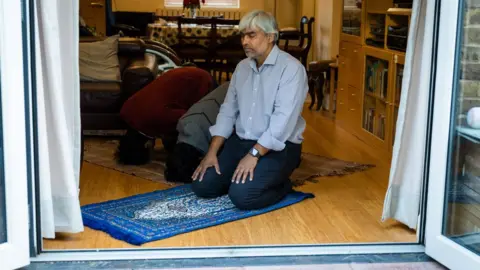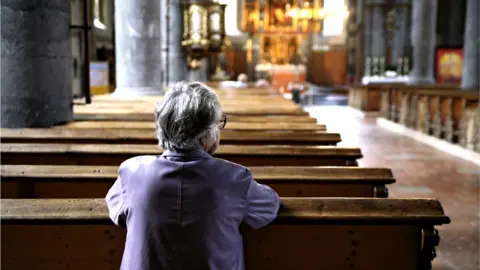Coronavirus: Mosques told not to reopen despite government plan
 VICKIE FLORES/AFP
VICKIE FLORES/AFPA senior Imam has advised mosques not to open until they can hold congregational prayers, despite government plans for places of worship.
The government is expected to announce that churches, mosques and synagogues in England can open their doors for private prayer from 15 June.
But as mosques are primarily for congregational prayers Muslim leaders have warned the plans lack clarity.
Imam Qari Asim said opening them would "cause more challenges".
Full services and weddings will still be banned under the measures, which the prime minister is expected to outline to his cabinet on Tuesday.
Northern Ireland already allows private worship but Scotland and Wales have not yet done so.
Downing Street says any changes are contingent on the government's five tests for easing lockdown continuing to be met.
Imam Asim, chairman of the Mosques & Imams National Advisory Board (MINAB), has called on mosques not to reopen until it is safe to do so and they are able to hold congregational prayers.
He said: "The fundamental difference between mosques and some other places of worship is that mosques are first and foremost used for congregational prayers.
"Individual prayers can be performed anywhere, primarily at homes. Accordingly, opening the mosques on 15 June will cause more challenges for mosques and imams as the expectation from the community will be to resume collective worship."
Harun Khan, secretary general of the Muslim Council of Britain, said communities needed "unambiguous guidance" so they could ensure the safety of everyone.
He said: "Mosques are provisioned primarily for congregational worship, so there is currently significant uncertainty and concern from mosque leaders on how the new regulations can actually be implemented."
Mr Khan added that the MCB, an umbrella group of Muslim associations, had been consulting with communities across the country and it was clear proactive planning about reopening mosques had been taking place.
MINAB has also called on the government to allow small groups to meet for the five daily prayers in mosques, so long as social-distancing and other measures are respected.
The group has prepared guidelines for mosques to start putting in place ahead of their eventual reopening, with particular concern about the impact of coronavirus on BAME communities.
 Getty Images
Getty ImagesCardinal Vincent Nichols, the Archbishop of Westminster and the most senior Roman Catholic in England and Wales, thanked the government and said the move was the first, measured step in restoring church services.
He said it was important that "every care is taken to ensure that the guidance given for this limited opening is fully observed, not least by those entering our churches".
But he added that not every Catholic church would be open on 15 June.
"Local decisions and provision have to lead this process," he said.
A No 10 spokesperson said Mr Johnson recognised the importance of people being able to have space to "reflect and pray, to connect with their faith, and to be able to mourn for their loved ones".
Communities Secretary Robert Jenrick said ensuring places of worship could reopen was a priority as their "contribution to the common good of our country is clear" and said faith communities had shown "enormous patience and forbearance" since the lockdown came into effect.
Places of worship have been closed for almost two months, and in some cases even longer, after closing their doors due to the coronavirus pandemic.
Mr Jenrick has warned that large gatherings will be difficult to manage for some time, particularly with the demographics in some religions meaning many could be vulnerable to the virus and because practices such as singing could enable the virus to spread more freely


While the burden of the lockdown has fallen evenly across the population, religious groups have been forced to sacrifice major festivals that punctuate their practice over the year.
Christians were unable to attend Holy Week services, Muslims have experienced Ramadan without communal Iftar meals each day.
The Jewish community experienced Passover without extended Sedars and Sikhs were unable to mark the festival of Vaisakhi.
Although places of worship will reopen solely for private prayer, it seems the government was persuaded that if the public was ready to re-engage in retail therapy, then people of faith ought to be allowed to enter places of worship.
All the major religious groups are preparing new hygiene protocols, doors are likely to be opened only for limited periods, numbers attending will be carefully controlled and there will be no communal worship.
But at a time of widespread grief and anxiety about the future, this will be a welcome opportunity to seek comfort and consolation in sacred spaces around the country.


- SCHOOLS: When will children be returning?
- EXERCISE: What are the guidelines on getting out?
- THE R NUMBER: What it means and why it matters
- AIR TRAVELLERS: The new quarantine rules
- LOOK-UP TOOL: How many cases in your area?

